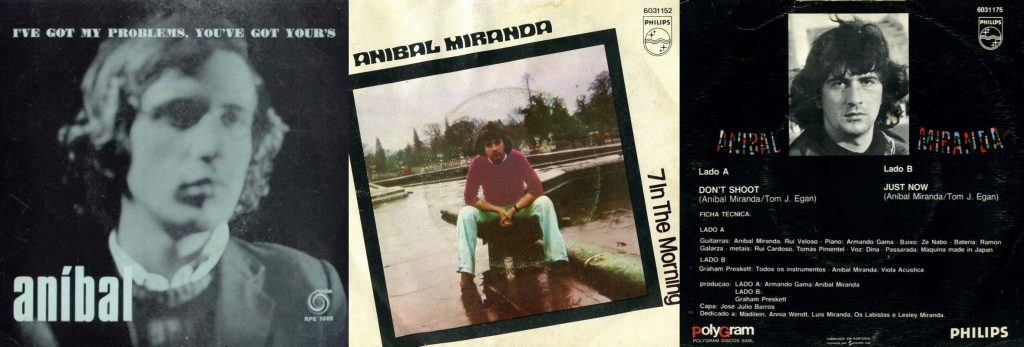Aníbal Miranda began to connect with music around 1963, after being greatly influenced by The Beatles, The Rolling Stones, Them or Kinks. Later he became deeply interested in the blues. Always captivated by pop music, he learned to play the guitar and, in the Foz do Porto area, formed his first group called Luv 24.
He then went to study at a boarding school in Ermesinde and there he also formed the first group of the school. After abandoning his studies, he joined the group Scorpion Music Incorporated, a satellite project of Pop Five Music Incorporated by Miguel Graça Moura, Pedro Vareta, Tózé Brito and Paulo Godinho.
It was also at this time that he formed a new group in the Foz do Porto area called Quinteto KW and, shortly afterwards, when he went to live in the parish of Antas, he created Alfas. All these groups only played covers of foreign bands and performed at parties.
At the age of 17, he recorded his first single with Karin Wall and Manuel Lourenço. The album, all acoustic, is released by Vadeca. In 1969 he emigrated to London where he remained for around a decade. There, he is part of the Mitzi Group, a live music group that only plays in bars and pubs in London. You learn a lot and gain a lot of knowledge in the field, which will prove to be important.
He was John Denver’s second guitarist at the beginning of his career and had the opportunity to participate in a jam session with Mark Knopfler before Dire Straits recorded the LP “Sultans of Swing”. He composed and recorded short pieces for the London Film Institute as background music for short films and documentaries without dialogue. He then began recording his own songs, paid for out of pocket, including the song “7 In The Morning”, which will later be released on vinyl.
He returned to Portugal in 1980 where he released the aforementioned single and was invited by Júlio Isidro to open Camel’s three shows, which would only take place at the one in Coimbra. Heading to the Algarve, it shares the bars of Albufeira with Adelaide Ferreira. He composed and recorded the single “Don’t Shoot” for Polygram, which reached 6th place on the international albums of the Rádio Comercial program “Rock em Stock”.
He later returns to Porto where he will play at Rui Veloso’s house before he becomes known and publishes anything. He also became manager of Pesquisa and later Taxi, being co-producer of the first album. After this experience, he made a television program for the then RTP 2 called “Hoje Convidamos” where he was able to invite whoever he wanted.
He forms Martinis, a project for which he would be the vocalist and guitarist and with whom he would tour around the country and record a single titled “Mini-Saia”. It was still part of the Atlantic. He then began to follow up on what he had already done with Táxi: he arranged an audition for João Loureiro dos Bananas (later Ban) in Lisbon, began negotiations with EMI–Valentim de Carvalho, launched the project commercially and then moved away from it. .
He later became manager of groups such as Bad Legacy, Dr Fausto and Paupelino Sacrilégio, Minnemann Blues Band and Tsé-Tsé.






Tenho de procurar videos novos e repor!
La musica è il battito del cuore dell’universo.
i love them i used to play them on a tape radio
So classic..miss her so much
Her? Are you sure he was a girl? 🤣🤣🤣🤣
O som não é mau, pena que já não existam
[…] in December 1984 under this name, Martinis went back to more distant roots when they were Aníbal Miranda‘s garage band with vast influences from Lou Reed or Iggy Pop. The band was initially formed […]